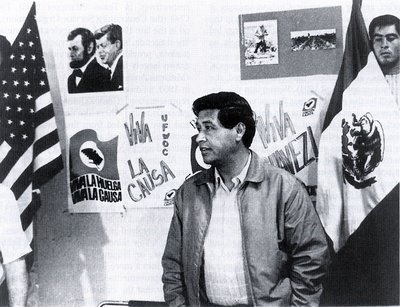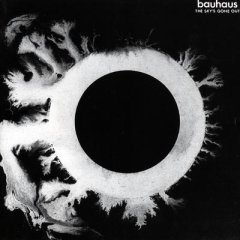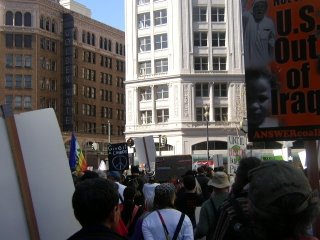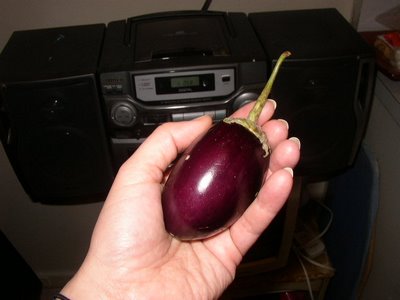 Cesar Estrada Chavez was born March 31, 1927 near Yuma, Arizona. Chavez was named after his grandfather, who escaped from slavery on a Mexican ranch and arrived in Arizona during the 1880s. Chavez' grandparents homesteaded more than one hundred acres in the Gila Valley and raised 14 children. Chavez' father, Librado, started his family in 1924 when he married Juana Estrada. Cesar was the second of their six children. Librado worked on the family ranch and owned a store in the Gila Valley. The family lived in an apartment above the store.
Cesar Estrada Chavez was born March 31, 1927 near Yuma, Arizona. Chavez was named after his grandfather, who escaped from slavery on a Mexican ranch and arrived in Arizona during the 1880s. Chavez' grandparents homesteaded more than one hundred acres in the Gila Valley and raised 14 children. Chavez' father, Librado, started his family in 1924 when he married Juana Estrada. Cesar was the second of their six children. Librado worked on the family ranch and owned a store in the Gila Valley. The family lived in an apartment above the store.  Chavez began school at age 7, but he found it difficult because his family spoke only Spanish. Chavez preferred to learn from his uncles and grandparents, who would read to him in Spanish. In addition, Chavez learned many things from his mother. She believed violence and selfishness were wrong, and she taught these lessons to her children.
Chavez began school at age 7, but he found it difficult because his family spoke only Spanish. Chavez preferred to learn from his uncles and grandparents, who would read to him in Spanish. In addition, Chavez learned many things from his mother. She believed violence and selfishness were wrong, and she taught these lessons to her children.  In the 1930s, Chavez' father lost his business because of the Great Depression, and the family moved back to the ranch. However in 1937, a severe drought forced the family to give up the ranch. The next year, Chavez and his family packed their belongings and headed to California in search of work. In California, the Chavez family became part of the migrant community, traveling from farm to farm to pick fruits and vegetables during the harvest. They lived in numerous migrant camps and often were forced to sleep in their car. Chavez sporadically attended more than 30 elementary schools, often encountering cruel discrimination.
In the 1930s, Chavez' father lost his business because of the Great Depression, and the family moved back to the ranch. However in 1937, a severe drought forced the family to give up the ranch. The next year, Chavez and his family packed their belongings and headed to California in search of work. In California, the Chavez family became part of the migrant community, traveling from farm to farm to pick fruits and vegetables during the harvest. They lived in numerous migrant camps and often were forced to sleep in their car. Chavez sporadically attended more than 30 elementary schools, often encountering cruel discrimination.  Once Chavez completed the eighth grade, he quit school and worked full-time in the vineyards. His family was able to rent a small cottage in San Jose and make it their home. Then in 1944, Chavez joined the navy and served in World War II. After completing his duty two years later, Chavez returned to California. He married Helen Fabela in 1948, and they moved into a one-room shack in Delano. Chavez again worked in the fields, but he began to fight for change. That same year, Chavez took part in his first strike in protest of low wages and poor working conditions. However, within several days the workers were forced back to the fields.
Once Chavez completed the eighth grade, he quit school and worked full-time in the vineyards. His family was able to rent a small cottage in San Jose and make it their home. Then in 1944, Chavez joined the navy and served in World War II. After completing his duty two years later, Chavez returned to California. He married Helen Fabela in 1948, and they moved into a one-room shack in Delano. Chavez again worked in the fields, but he began to fight for change. That same year, Chavez took part in his first strike in protest of low wages and poor working conditions. However, within several days the workers were forced back to the fields.  In 1952, Chavez met Fred Ross, who was part of a group called the Community Service Organization (CSO) formed by Saul Alinsky. Chavez became part of the organization and began urging Mexican-Americans to register and vote. Chavez traveled throughout California and made speeches in support of workers' rights. He became general director of CSO in 1958.
In 1952, Chavez met Fred Ross, who was part of a group called the Community Service Organization (CSO) formed by Saul Alinsky. Chavez became part of the organization and began urging Mexican-Americans to register and vote. Chavez traveled throughout California and made speeches in support of workers' rights. He became general director of CSO in 1958.  Four years later, however, Chavez left CSO to form his own organization, which he called the National Farm Workers Association (NFWA). The name was later changed to the United Farm Workers (UFW). In 1965, Chavez and the NFWA led a strike of California grape-pickers to demand higher wages. In addition to the strike, they encouraged all Americans to boycott table grapes as a show of support. The strike lasted five years and attracted national attention. When the U.S. Senate Subcommittee looked into the situation, Robert Kennedy gave Chavez his total support.
Four years later, however, Chavez left CSO to form his own organization, which he called the National Farm Workers Association (NFWA). The name was later changed to the United Farm Workers (UFW). In 1965, Chavez and the NFWA led a strike of California grape-pickers to demand higher wages. In addition to the strike, they encouraged all Americans to boycott table grapes as a show of support. The strike lasted five years and attracted national attention. When the U.S. Senate Subcommittee looked into the situation, Robert Kennedy gave Chavez his total support.  In 1968, Chavez began a fast to call attention to the migrant workers' cause. Although his dramatic act did little to solve the immediate problems, it increased public awareness of the problem. In the late 1960s, the Teamsters attempted to take power from the UFW. After many battles, an agreement was finally reached in 1977. It gave the UFW sole right to organize field workers.
In 1968, Chavez began a fast to call attention to the migrant workers' cause. Although his dramatic act did little to solve the immediate problems, it increased public awareness of the problem. In the late 1960s, the Teamsters attempted to take power from the UFW. After many battles, an agreement was finally reached in 1977. It gave the UFW sole right to organize field workers.  Cesar Chavez died on April 23, 1993.
Cesar Chavez died on April 23, 1993.Researcher: Rachel Sahlman
Chavez's hard-fought gains are eroding Commentary by Raul Reyes























